Spoon was created to be a food network for college students to intelligently discuss and share tips about eating in college. We’ve covered fun topics ranging from from Chipotle hacks to next-level microwave mug recipes. But this week, we’re taking on a more serious note in an attempt to spark conversations about that people aren’t as willing to discuss.
This week is National Eating Disorder Awareness Week. It’s a movement dedicated to raising the level of public understanding of and access to resources about an often stigmatized mental health disease. It’s all about giving a voice to a silent monster—a monster that comes in all sizes and shapes. So we asked you, our readers, to share your raw, honest experiences with eating disorders to show those currently struggling that they aren’t alone.
The responses poured in. We’ve decided to release them, unedited, in three parts to preserve their integrity and sincerity. This is part one. You can find part two here and part three here.
Here are your stories.
I’ve been bulimic and anorexic for about four years now.
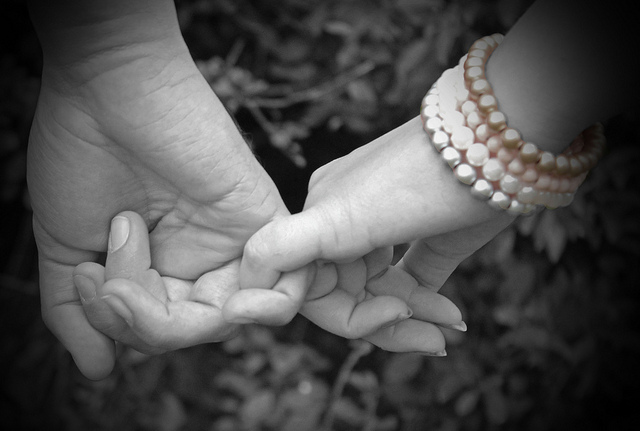
I’ve taken pills, I’ve fasted, I’ve done juice cleanses. I’m actually healthier now than I was when I was 16, but everyday is a struggle, every meal is a struggle, and every moment food hits my mouth is a struggle.
–Cornell University
I was never formally diagnosed with an eating disorder.
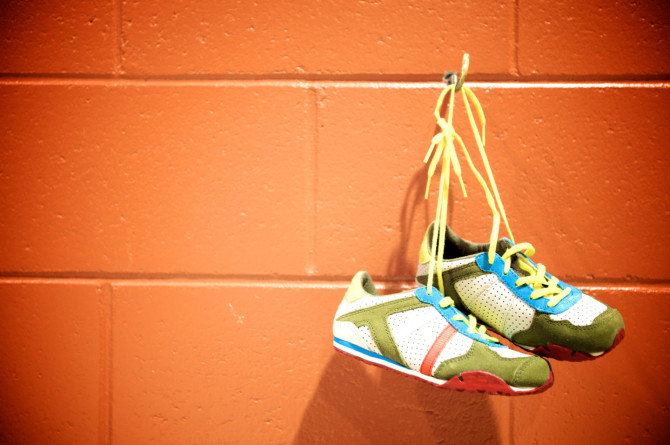
Photo courtesy of imgkid.com
I never got quite skinny enough for people to be incredibly concerned about my physical health. I never lost hair, had protruding bones or suffered from fatigue. And I never told anyone that I was struggling. Sure, some people might have noticed a sign here or there, but I was careful and so good at faking it. For a while, I was even able to fake it to myself. I thought that I was fine.
For years, after I’d come to terms with the fact that I did in fact suffer from an eating disorder of some sort, or at the very least an extremely unhealthy relationship with food and exercise, I still didn’t know if that was enough. I didn’t have the severe symptoms of a true anorexic, I didn’t binge and purge like a bulimic. You could say I had “EDNOS” or “orthorexia,” but these labels are just as troubling as the diseases themselves. For upwards of four years of my life, I was unable to ever say the words “I have an eating disorder” because even in my own state of suffering, I didn’t feel that I lived up to the true horror stories of what an eating disorder can do.
I’m here now to tell you that a case doesn’t have to be extreme to hurt. And you don’t have to match all of the symptoms from some silly check list to deserve help and know that you’re not alone. I still struggle with my “eating disorder” every day, and the fact that I’m still not quite able to own up to it without feeling uncomfortable is at the heart of the problem. My disorder was a secret that I thought I could smother into oblivion. Instead, it just got bigger and harder to cover up.
Our society is big on pointing out its problems with issues like eating disorders, but not so big on seeking out tangible solutions. So here’s mine: don’t be afraid to speak out. Don’t be afraid that just because your problems may not line up with someone else’s that they don’t matter. And don’t be afraid that you’ll be judged for being any more or less affected than you yourself know that you are.
In the years since I finally bounced back from the lowest point of my disorder, I’ve finally been able to open up to a few people, even if not in full, about my struggles. And each and every time, I’ve found out that I am not alone. That the years I spent feeling isolated and unimportant were a product of my own fears, not the community around me.
We all struggle with something. So don’t be afraid to share it. You’ll find, like I did, that the world is much less black and white than you think.
-Northwestern University
Having an eating disorder was one of the hardest things I’ve ever dealt with in my life.

I know saying that is super cliché, but it was. I am lucky enough to say my parents are still together, I’ve never had a close relative or friend die or be seriously injured and I’ve generally been pretty happy. I don’t know what brought it on. I’ve always struggled with body image issues (and on top of that, I have always been thin. I’ve never been overweight, but it’s a mental thing). When I had my eating disorder, I wasn’t enjoying life anymore. I would deprive myself of eating things I liked, and if I caved and ate something I wanted to, I would chew my food and then excuse myself to spit it all back out. It was disgusting.
I had a best friend from childhood come to visit me, and my eating disorder was changing my mood so much that I was a complete bitch to her. I was moody, angry, anxious and obsessed with food and eating. That’s all I could think about. In addition to ruining her trip for her, my eating disorder made me so angry and irritable that it drove my then-boyfriend of over a year to break up with me. My mind was constantly consumed with eating, and since I wasn’t eating enough, I was always irritable and moody.

The worst part was, I told my mom I thought I had a problem and she completely blew it off like it was nothing. I felt like nobody could take me seriously. Eventually, I was extremely thin—I was hardly eating at all and exercising twice a day—running a lot and doing Jillian Michaels-type resistance exercises.
I was lucky enough to have a running coach that took notice of my weight loss and mentioned to me that I was looking unhealthy and not acting like myself. I confided in him and he convinced me that in order to perform well in my cross country season, I was going to need to stop my problem. Then, I could finally be back to my normal self. After a few months, I was much better .
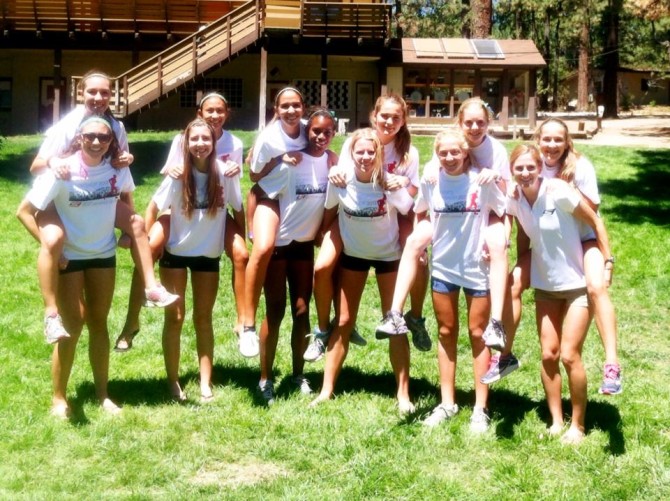
Every day is hard. You have good days, and you have bad days. Since then, I have gained weight. I still work out five times a week, and frankly, I am much happier to look STRONG than to look SKINNY. I go to the gym not to “lose weight” but to feel challenged and accomplished. It also makes me happy to look at the boys squatting next to me and see that I’m squatting way more weight than them. I encourage all girls and boys to find someone that they can talk to.
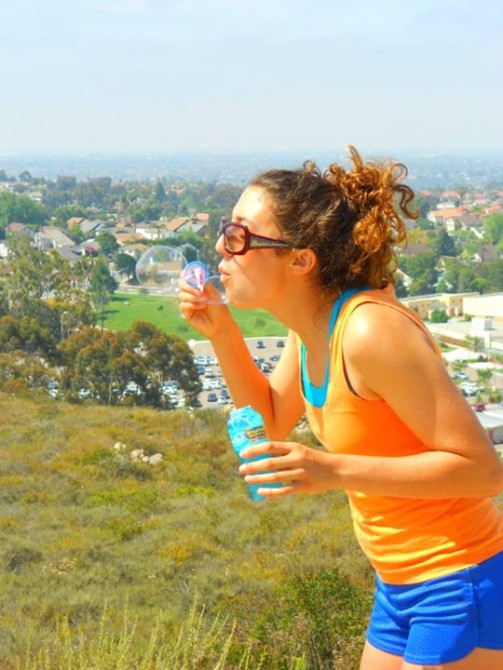
But more importantly, I encourage the friends and relatives of those being affected by an eating disorder (even if they don’t know it outright, but just suspect it). You can help them. You have more power than you think you do, especially when it comes to that. No one should ever have to push away their loved ones like I did. If you can help someone, please do. It’ll change their whole life.
–University of California, Berkeley
I was 14 when I was first called fat.
It was my Granny after a family picnic that included lots of cheeses and tasty desserts. These are still some of my favorite things to enjoy. Then, ex-friends, ex-boyfriends, bitchy girls and guys at bars after turning them down politely. I don’t like going to bars really because some people act like they can violate your body by making comments or groping my body.
I have had to find empowerment and improve my body image of myself. I’ve done this by managing what I eat, wear and how I look. Having more control over what I eat after moving but of my parents house has made me feel more independent, but because I am more independent now I need to provide for myself and I have had trouble feeding myself adequately.
When I have access to food I tend to binge and emotionally eat and then I hold out for as long as I can before I eat supplementing myself to vigorous exercise and using calorie-counting apps to try to stay on track. I don’t know that these are bad, but my feelings around food are very strange. Overall I’m trying to just enjoy it more and have a healthier relationship with food since it is such a big part of my life.
Eating disorders are extremely tricky.
This is something I never would have imagined being able to say from personal experience. I now personally know four beautiful, smart, athletic, unique girls who suffer from eating disorders. Each are in various stages of the disorder or recovery. None of their stories are the same. There is not a set path of losing weight, receiving treatment and becoming healthy again like so many of the movies in health class tried to show.
It’s so hard to watch someone you love so much slip away. That’s the hardest part, that the person you once knew is a fraction of themselves, blind to the irreversible damage they are causing their body.
When my friend began to lose weight, I was shocked but turned a blind eye. Of course she would stop, she was smart, she knew better than to have an eating disorder. She was a star athlete with an amazing body, she didn’t need to lose weight. My friends all agreed, and so we kept our mouths shut.
Except she didn’t stop. The months went by and she slowly shed more and more of herself until she literally was a shadow of her former self, a tiny skeleton with muscle slapped on. That was the worse part, that because she was fit she justified losing so much weight. As she went off to college, her new friends thought thats how her body had always been, creating a world where her eating disorder still did not exist.
Then came the constant worrying, stalking her Facebook feed to see if any new photos had been uploaded showing what I knew to be true but didn’t want to say out loud: my best friend has an eating disorder.
Our friends called each other constantly, shocked, crying, angry each time a new picture was uploaded. What do we do and how do we help her? You suddenly forget how close you once were and become tongue-tied. It’s like you’re asking a stranger to share their deepest secret, except that stranger is your best friend and you already know what the answer is.
I waited two months before I gently questioned her weight loss. My inquiries were brushed off with different excuses that I was too scared to challenge. It took me another month to become more adamant, telling my friend what she was doing to her health if she continued living this way, instructing her to get help. She responded with how grateful she was that I cared enough to look after her, yet avoided the words “eating disorder.” My friends all tried here and there to get through to her, but eventually we all kind of gave up. How do you get a person to see what they are blind to while still trying to be loving and supportive?
It’s been over two years since my friend began losing weight, and she still has yet to be treated for her eating disorder. I want to help, reach out to her every day until she gets the help she needs.
But it’s tricky. How do you maintain a relationship with your friend if you’re constantly mothering her, telling her things she doesn’t want to hear but needs to, all the while trying to show your love and support of however she decides to get treated? It’s really hard deciding whether to be stern and direct or loving and passive.
Because eating disorders are tricky when they happen to people you love.
I don’t think I have an eating disorder.
Honestly, for four years I haven’t been able to figure out what to call it or what to think of it. I don’t think of myself as fat, but I’m definitely not skinny. I’ve gained significant weight since 11th grade. Being short doesn’t help my appearance much, and it doesn’t help that I was always a tiny kid. My mom literally misses how skinny I was in middle school and high school. I know my family wants me to lose weight because they know I want to, but they don’t realize how the pressure builds.
I can’t even imagine how they’d feel if they knew I’ve been periodically bulimic for the past four years. And can I even label it bulimia? Periodic bulimia? Is that a thing?
My eating can be disordered—some days I “binge,” and more often I find myself curled over the toilet in my shared dorm bathroom, hoping no one will walk in to hear me. But when I read other people’s personal stories about eating disorders, I can’t help but feel that I don’t have that. I don’t eat junk food to the point where I feel like I can’t stop, I don’t over-exercise, I don’t have body dysmorphia, I don’t starve myself. I go weeks, maybe months, without making myself throw up. I love eating healthy, and for the most part I feel like my relationship with food is fine.
But then I’m back over the toilet, a few days in a row, a few weeks in a row, depending on my stress level, I guess? I honestly don’t know if I need to get help. I don’t think it takes a toll on my mental or physical health, and for the most part I don’t think I have a problem. But I can’t even think of talking out loud to my friends or family about it without crying.
I’m embarrassed by it, and I know something is wrong, but what would classify my purging as an eating disorder? If I “get help,” what would that even mean if my periodic bulimia isn’t affecting my social life, academics or physical health?
I have to believe there are a lot of other college students with similar habits to mine, and similar thoughts. There’s no voice in the back of my head telling me that eating is not okay. I am lucky my disordered eating is not taking over my life, and I am lucky the articles I read about eating disorders don’t totally resonate with me. But in reality, my throwing up will always hover over me. I still don’t know what to make of this, but I appreciate the opportunity to get it down in writing. Thank you.
I know I’m a bulimic.
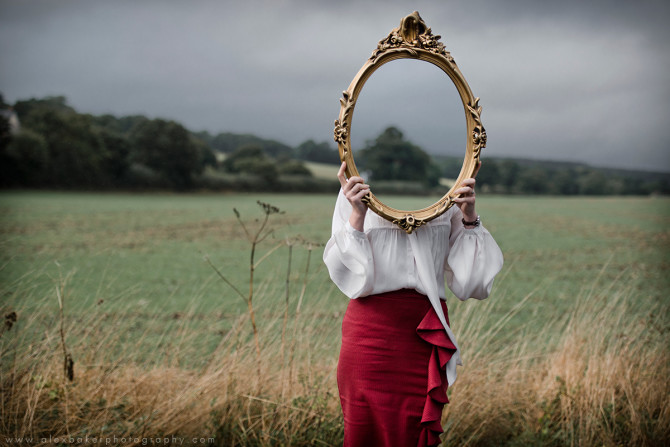
Photo courtesy of Alex Baker Photography
But I’m not going to do anything to stop it because I know it will never (physically) kill me. But damn does it rip me to shreds on the inside.
I wake up every morning, pull up my shirt and look at how flat my stomach has gotten over the previous night’s sleep. If my stomach feels fairly tight and I can see the slight curves of my waist I’ll turn to view my side profile, suck in the little remaining bulge and stare at my reflection, proud of how I look in that moment. But if there’s any bulge, or I can feel the flabbiness of my skin as I start my day, I can guarantee that I’ll be feeling like absolute shit all day long. I’ll tell myself I’m just an ugly, nerdy Asian who wasn’t blessed with the stick straight genes that it seems every other Asian girl here has.
No matter how I begin my day, however, I’ll schedule my day around my daily trip to the gym. I try to go to the gym every single day. Probably because I have no self-control around food and binge every single damn day. It doesn’t matter that I have homework, an essay or a test the next day—the trip to the gym comes first. Because if I don’t make that trip to lift weights, go on the elliptical or run…I’ll get even fatter than I am already. My anxiety shoots up the roof and drives all my thoughts when I’m not able to go workout. I’ll usually compensate by skipping a meal or eating only salad for the next two days.
I guess the worst part is that I know what my problem stems from. Obviously I have some self-esteem issues, but I think everybody does. I know if I didn’t spend so much time stalking other girls on Instagram and Facebook, I wouldn’t be constantly comparing my body to theirs. I’ve even tried to delete Instagram and Facebook off of my phone. I didn’t even last eight hours. I can’t stop looking at the skinny, gorgeous models’ images, wishing that I was as beautiful as them, as skinny as them. Because if I somehow had their body, my life would be as picture-perfect as theirs are.
I’m working on my issues, but I’m not sure they are getting any better. In fact, I’ll probably find myself trying to go to the gym twice a day now that spring break is coming up.
-University of Texas at Austin
I used to eat anything I wanted.
I love food, but I have always wanted to be skinny. Now let me just say, I was never fat. But one day, my weight became too much to me. I decided to make a change, a drastic one. I started exercising a lot, and I kept eating less and less. I convinced myself that I didn’t like the foods I used to like. I learned to like the feeling of starvation; the ache of success and progress.
In three months, I lost a lot of weight. I saw my ribcage, had no muscle. But I was skinny. About two years later, I have fluctuated. Sometimes I gave up, sometimes I went overkill. I never went back to my heaviest. But the problem is that there is always the feeling of not enough. I am not skinny enough, I don’t try hard enough, I’m not pretty enough.
What is the goal? Who am I doing this for? What am I trying to prove? What will I get out of doing this that I don’t already get? These questions remain unanswered. I just want to eat whatever I want, whenever I want, and to be skinny. Unfortunately, this will never come true.
When I look back on my youth now, it’s hard to believe there was ever a point where I saw my body or food as the enemy.
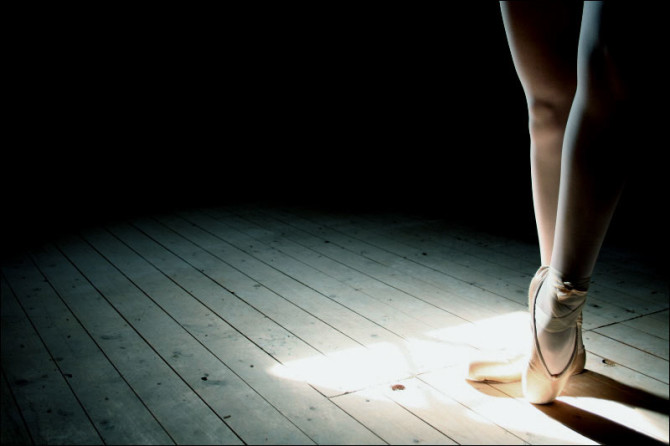
Photo courtesy of fanpop.com
I was always a chubby kid, but it was never something I paid much attention to. My family would tell me I was cute, and I had enough personality and spunk to ever think otherwise.
I distinctly remember one day during a dance class looking around the four-mirrored walls thinking I was so much larger than all the other skinny, beautiful girls. I felt so uncomfortable in my fleece Gap sweatpants and the t-shirt that I now felt like wasn’t covering any part of my body. After that point, my body became a source of distress. Middle school was a hell where peers told me that I was not beautiful, that I didn’t matter because I wasn’t skinny or blonde or desirable.
In some strange twist of fate, I grew five inches and gained no weight before high school. I started hearing from so many people that I looked good. That I was beautiful. I was wanted by boys, and so I liked myself. I was skinny. I felt good. Although I didn’t recognize it then, I now realize I was making really dangerous dietary choices to maintain that weight and confidence. I was not getting nutrients.
I remember riding in the car with my mom and my sister and hearing them tell me that they thought I had body dysmorphia—a disease where you see your body as a distorted version of itself. Through these torturous lens people see exaggerated versions of their flaws, causing them to hate parts of their body that make them who they are. I thought they were being ridiculous; all my friends were skinny, and none of them had problems. We were teenagers. This was life.
As high school got harder, I found myself baking to relieve stress. I found myself finding comfort in food—healthy, hearty, delicious food—to keep myself sane. I cared less about how others would perceive me, because I knew that my brains and my compassion were what was important about me.
It took me several years from that point to really feel comfortable in my body—which, even though it’s not stick-thin, is beautiful. I look back on myself in middle school and find myself wishing I could tell that 12-year-old girl that being yourself is so much more satisfying than being who someone else wants. I still struggle with wanting to achieve certain standard of beauty, but I know that is life and that may never go away. I feel so lucky to be able to know that it’s not true when someone says, “nothing tastes as good as skinny feels.”
I think it is so important that we put a spotlight on eating disorders because they come in so many different forms. We often think that they don’t apply to us because of how pervasive standards of beauty are. But, as a 21-year-old woman, I look back on my youth and I feel scared about how easy it is to think that these really dangerous thoughts and feelings are just normal.
In junior high, I was the new girl.
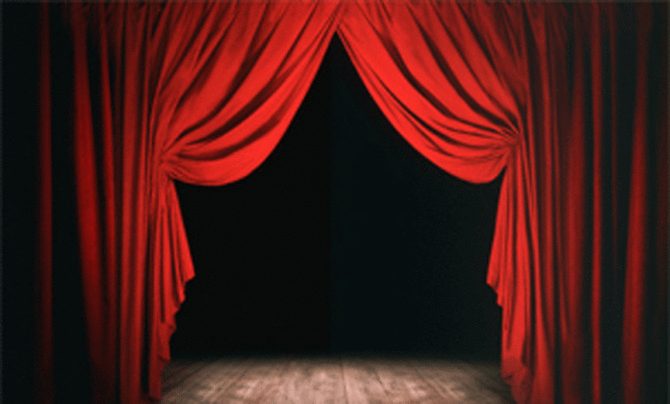
Photo courtesy of persistencies3.rssing.com
So I signed up to be in a play, hoping to make friends. One of the older boys had to pick me up, princess-style, for one scene. At our first rehearsal, he dropped me in front of everyone. Trying to save his own pride, he told everyone, “She’s really heavy.”
Of course, I wasn’t (not that it would’ve mattered), but the incident sparked a string of unhealthy eating that lasted for the next several years. My perfectionistic personality fed into the habit even more. Fortunately, I had friends and family that supported me, and even though the habit is easy to fall back into still today, I’ve learned to fight it and love myself and food again.
Sending big hugs to everyone who has had similar fallouts with food. It’s never too late to form healthy (and happy) habits.
In high school I had bulimia.
Every night after dinner I’d go up stairs and throw up everything I had eaten. I would also eat massive amounts of food, feeling like I was unable to stop, and then purge until there was nothing left.
It started out with me thinking I could just lose a few pounds, so I decided to go on a diet of eating healthy and counting calories. That diet turned into a full on eating disorder. I would look in the mirror and physically see myself expanding and getting fatter. I limited my caloric intake I’d purge if I ate anymore than that because I was scared of eating anything over my limit. I was completely occupied with calories rather than nutrition and I still have some permanent effects from the eating disorder.
Although it’s been years, and I see myself as recovered, I still don’t think it will ever completely leave me. I still overthink about what I eat. Sometimes I try to limit my calories, and very rarely I’ll purge out of habit. Eating disorders are not only mental and physical illnesses, but they’re addictions. I would never have stopped unless someone found out, and thankfully someone did.
I tried to make myself throw up more times than I can count from the ages of 13 to 20.
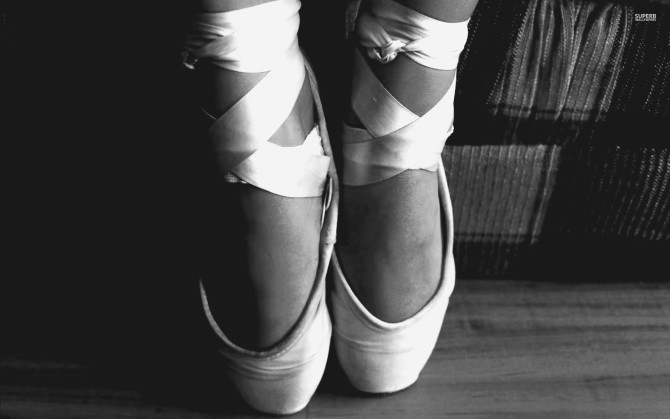
Photo courtesy of HD Wallpapers User blackjake
I never could manage to make anything come out, and I felt like an utter failure because of it. I convinced myself I was so pathetic, I couldn’t even throw up right.
I grew up in dance, observing and comparing myself to girls with skinnier legs, smaller stomachs, better figures and (I told myself) more confidence. I never thought I was obese, but I knew I wasn’t healthy or a good weight either. And I sometimes was jealous of those who where more overweight, because they seemed still so much more comfortable in their bodies than I was.
I would eat very little for several days or weeks, and then I would binge until I felt so disgusted with myself and wanted to hurt myself. So I would restrict my eating again. I was never able to go more than three days without food, and I thought that made me even more of a failure as well.
It took me losing my strength (due to a long-term joint dysfunction) and becoming so much worse (being suicidal, cutting and restricting food to punish myself for being me and depression controlling my life for three years), being in therapy and then finding a physical therapist who could help me with my joint dysfunction and help me find my strength again before I started looking in the mirror without a stream of insults running through my brain.
I now work out regularly and eat mostly healthy (I don’t restrict anymore, although I do still binge at times), and can control my depression enough to feel happy. I used to think of myself as a failure for not even being able to have a real eating disorder. But that, like all my other negative thoughts, was a lie. I had a problem with food and my body image, and I tried continuously to do unhealthy things to change it.
It wasn’t until I started doing healthy things that I got better. First with cutting, and then eating and then the depression. It was a long process and I still avoid mirrors when I’m having a bad day, because I know if I look a little too long or at the right angle, that voice telling me I’m a failure, fat and stupid, won’t be able to shut up.
I’ve spent my entire life obsessed with food and dieting.
If anyone would have told me early on that my whole life would have an undercurrent of food preoccupation, I’d have said they were crazy. Who would choose to waste their life thinking about food??
Unfortunately, me.
Early in life, my dad “helped” me understand that I was eating too much by embarrassing me at the family table about the number of helpings I was taking. This humiliation led to hiding food and eating when no one was around—whether I was hungry or not.
In my high school junior year, I was diagnosed with hypothyroidism. With the addition of medication, I started losing weight and positive attention. This spiraled into bouts of anorexia and bulimia—my “sick” attempts at trying to control my eating, using all or nothing thinking. I spent many Friday and/or Saturday nights with another anorexic/bulimic friend, binge eating and then finding restaurant/gas station bathrooms to vomit in when there were no parties or “action” going on otherwise.
In my early 20s, bulimia remained, with many less anorexic moments, leading to weight gain. I was embarrassed, I had low self-esteem and I just wanted to stay hidden. On one occasion in my mid 20s, I thought I had thrown up blood and it freaked me out enough to stop for a while. Dieting/food obsession remained without the purging and I put on even more weight. I got married at age 25 and was, I thought, overweight.
In my 30s, still struggling with weight gain and finding the “right” diet, I starting purging again on occasion, seeing it as the only working alternative. I realized however that with two young children and a full time career, there was little time alone to pursue this and vowed to stop completely by the time I was 40 and I have.
Since then however, I have remained a binge eater and emotional eater. On good days, I control myself but on bad days, I eat an embarrassing amount of food. I lost weight in my early 40s after following the LA Weight Loss program but after losing my managerial position at the age of 41, I slunk into a deep depression and gained all of the weight back. I’ve tried Weight Watchers, low-fat diets, NutriSystem, a weight loss group at a hospital (which included counseling), Atkins, South Beach. I’ve tracked, I’ve measured, I’ve researched, I’ve read. I have a FitBit, a treadmill and an elliptical machine. At age 45, I am embarrassed of my weight and hide from life. I’m ashamed at what I look like, about what I’ve done and about what I fail to control.
Food, with a sole purpose of giving life, has instead taken mine.
I pray that others don’t go down this same path—it’s such a waste! And I pray that I find relief somehow and don’t spend the second half of my life being tortured as well….
I am a 68 year old woman who started my ED when I was 13.
My mother touched my stomach and told me that if I ever wanted anyone to love me I had better not gain any weight. That was the first day I learned how to purge.
I have struggled with the ED from some times purging up to five or six times a day. I have throat troubles. Had to have a few surgeries because of it. This past year I was the best I have ever been with only purging maybe six times.
Just the other day I purged again after not doing it for a full four months.
I didn’t know that my kids knew I had been purging for year. I found one of my girls doing it and asked her why. She said, “Mom, you do it all the time.” It broke my heart. Here I had lead my innocent daughter into an ED without even knowing. Did I quit at that point? No, I didn’t, but I was more careful to not do it when anyone was home. I would go without eating until I was alone.
After my kids grew up the ED got much worse for years.
God help me, I do not want to repeat what I have gone through in the past.
Nobody has ever diagnosed me with an eating disorder.
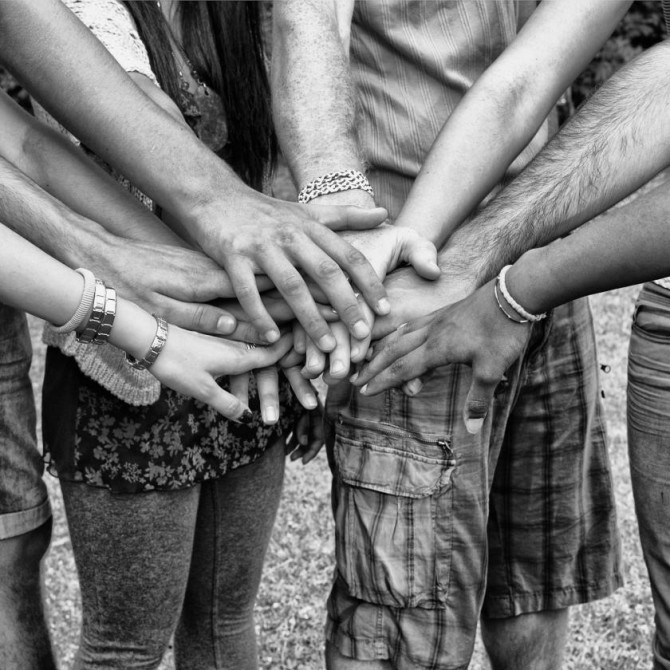
“Too skinny”—yes. “Extremely conscious of calorie intake”—definitely. But what I was going through was never labeled. I had lost a significant amount of weight one year in college due to drastically cutting back my eating and working out every single day—and I suddenly found myself obsessing over calories in vs. calories out.
I wasn’t necessarily unhappy with the way I looked, but I wanted to lose weight—which at the time, I thought I needed to lose (looking back, I didn’t have so much weight to lose). I knew what I was struggling with, despite not being severe, was a problem. I felt guilty/sad after eating just one high-calorie/fattening item, would occasionally binge eat and frequently planned my meals for the day/week well in advance. I love to eat, but instead of being enjoyable it became anxiety-inducing.
Eventually, I decided to open up to family/friends/a therapist about it. Talking about it and recognizing that I had some sort of a problem, no matter the size, was the hardest part—but it made all the difference in me getting better. It took a while, and I’m still pretty sure I won’t ever completely be satisfied with my eating habits and body, but it’s gotten immensely easier with the support people I’m close to. I’ve come to peace with the fact that despite not being a size 0 anymore, I’m happier in my skin—I still eat plenty healthy, but life is about enjoying the little things—which might mean a cupcake or slice of pizza (or three) sometimes.
I want people to know that eating disorders come in all shapes and sizes, and even though it may not be severe enough to necessarily get medical attention, it can still be a constant battle. I’m lucky that it hasn’t become severe, but talking to someone before it did get to that point was important. Open up, seek the support of anyone close to you, and know that it can get better/easier.
Most importantly, I’ve realized that anyone who really matters in my life won’t feel differently about me whether I’m a few pounds lighter or heavier—in fact, all anyone wants to see is that I’m comfortable in my skin, no matter what the number on the scale says. “Beautiful” is not shedding those pounds or having a spring break bikini body. It’s embracing who you are while leading a healthy, balanced life. “Healthy” is not about weight or how you look (you can be perfectly healthy without being stick skinny)—it’s being happy with your choices and habits.
For me, it’s being able to finally enjoy my favorite carrot cake cupcake or bowl of mac and cheese.


